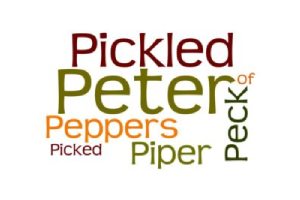The SHARP Method of Structuring a Speech

A speech is written for the ear and not the eye. Unlike reading an essay, a person cannot go back to review what you just said. Your audience is forced to go at your pace. Therefore, a speech must be clearly and simply organized to help your audience follow your line of thought. This post […]
Public Speaking: How to Manage the Fear, Part 2

The most important action you can take to manage the fear of public speaking is the unseen mental preparation, the inner game. The Inner Game 1. Know Your Audience If you are not familiar with your audience, you will need to do a little research. For my professional speaking presentations, I will conduct 3-10 informational […]
Public Speaking: How to Manage the Fear, Part 1

I am not going to tell you how to overcome the fear of public speaking. Instead, I am going to offer suggestions on how to manage the fear so that it is not debilitating. If you try too hard to suppress the symptoms of speaking anxiety—the shaky hands, the red face, the stiff or jerky […]
How to Write a Speech in 5 Minutes

You show up at an event and the organizer asks you to “say a few words” later in the program. That happened to me last month–in front of a few hundred people. You arrive at your Toastmaster meeting and a speaker didn’t show up, so the Toastmaster asks if you would like to take the […]
Polished Presenters Use Awesome Alliteration

Mickey Mouse, Donald Duck, Bugs Bunny, Fred Flintstone, SpongeBob Squarepants. All cartoon characters. All examples of alliteration. Alliteration is the repetition of the same sound at the beginning of nearby words. It is the fifth rhetorical device in the acronym SCREAM (Simile, Contrast, Rhyme, Echo, Alliteration, and Metaphor). Use the techniques of SCREAM to capture […]
The Echo Technique in Presentations

You may have heard people say that giving a speech is simple: Tell them what you’re going to tell them. Then tell them. Then tell them what you told them. That’s one basic, boring use of repetition. A more exciting use of repetition is the echo technique. Echo is the repetition of a word or […]
Using Contrast in Presentations

What if in Shakespeare’s play, Hamlet had said, “I wonder if I should kill myself?” Nobody would have remembered it. Instead, Hamlet says, “To be or not to be, that is the question.” Shakespeare knew the secret power of contrast. Contrast is the second rhetorical device in the acronym SCREAM (Simile, Contrast, Rhyme, Echo, Alliteration, […]
Never Speak Too Long Again!

A speech is like a woman’s skirt: it needs to be long enough to cover the subject matter but short enough to hold the audience’s attention. ~Author Unknown I’m not sure which is worse, a speaker who is oblivious to the fact that he or she has gone overtime or one who realizes it and […]
Never Forget Another Speech: Speech Memorization Techniques

I think the biggest reason that people fear public speaking is that they are afraid of opening their mouths and “blanking out” or sounding stupid. Some people even try to memorize their speeches. Right off, you should know that I’m not a big fan of speeches that are memorized word-for-word. I’ve tried it and found […]
Speaking from Notes: The Keyword Method

Which category do you fall under, when it comes to using notes for a speech: 1. The Forgetter. You are afraid you are going to forget what you want to say, so you use notes. 2. The Writer. You worked hard to get your wording just so and want to say it just like you […]
